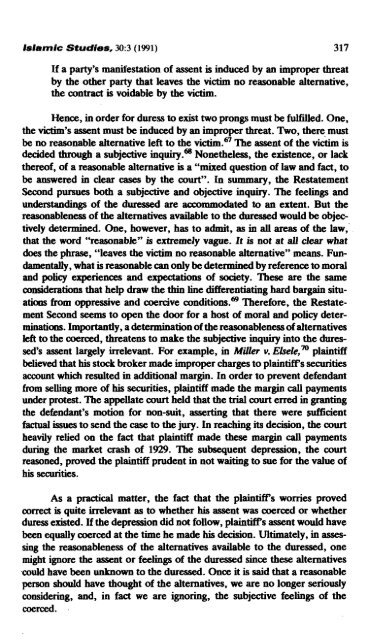LAW OF DURESS IN ISLAMIC LAW AND COMMON LAW: A ...
LAW OF DURESS IN ISLAMIC LAW AND COMMON LAW: A ...
LAW OF DURESS IN ISLAMIC LAW AND COMMON LAW: A ...
Create successful ePaper yourself
Turn your PDF publications into a flip-book with our unique Google optimized e-Paper software.
Islamic Studies, 30:3 (1991) 317<br />
If a party's manifestation of assent is induced by an improper threat<br />
by the other party that leaves the victim no reasonable alternative,<br />
the contract is voidable by the victim.<br />
Hence, in order for duress to exist two prongs must be fulfilled. One,<br />
the victim's assent must be induced by an improper threat. -0, there, must<br />
be no reasonable alternative left to the victim.67 The assent of the victim is<br />
decided through a subjective inquiry.68 Nonetheless, the existence, or lack<br />
thereof, of a reasonable alternative is a "mixed question of law and fact, to<br />
be answered in clear cases by the court". In summary, the Restatement<br />
Second pursues both a subjective and objective inquiry. The feelings and<br />
understandings of the duressed are accommodated to an extent. But the<br />
reasonableness of the alternatives available to the duressed would be objec-<br />
tively determined. One, however, has to admit, as in all areas of the law,<br />
that the word "reasonable" is extremely vague. It is not at all clear what<br />
does the phrase, "leaves the victim no reasonable alternative" means. Fun-<br />
damentally, what is reasonable can only be determined by reference to moral<br />
and policy experiences and expectations of society. These are the same<br />
considerations that help draw the thin line differentiating hard bargain situ-<br />
ations from oppressive and coercive conditions.69 Therefore, the Restate-<br />
ment Second seems to open the door for a host of moral and policy deter-<br />
minations. Importantly, a determination of the reasonableness of alternatives<br />
left to the coerced, threatens to make the subjective inquiry into the duressed's<br />
assent largely irrelevant. For example, in Miller v. ~ ikele,~ plaintiff<br />
believed that his stock broker made improper charges to plainti£Ps securities<br />
account which resulted in additional margin. In order to prevent defendant<br />
from selling more of his securities, plaintiff made the margin call payments<br />
under protest. The appellate court held that the trial court erred in granting<br />
the defendant's motion for non-suit, asserting that there were sdficient<br />
factual issues to send the case to the jury. In reaching its decision, the court<br />
heavily relied on the fact that plaintiff made these margin call payments<br />
during the market crash of 1929. The subsequent depression, the court<br />
reasoned, proved the phiintiff prudent in not waiting to sue for the value of<br />
his securities.<br />
As a practical matter, the fact that the plaintiffs worries proved<br />
correct is quite irrelevant as to whether his assent was coerced or whether<br />
duress existed. If the depression did not follow, plaintiffs assent would have<br />
been equally coerced at the time he made his decision. Ultimately, in asses-<br />
sing the reasonableness of the alternatives available to the duressed, one<br />
might ignore the assent or feelings of the duressed since these alternatives<br />
.could have been unknown to the duressed. Once it is said that a reasonable<br />
person should have thought of the alternatives, we are no longer seriously<br />
considering, and, in fact we are ignoring, the subjective feelings of the<br />
coerced.
















